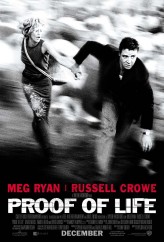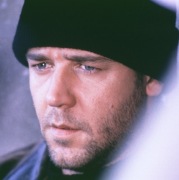| Proof of Life |
| |
 |
USA, 2000. Rated R. 135 minutes.
Cast: Meg Ryan, Russell Crowe, David
Morse, David Caruso, Pamela Reed, Anthony Heald
Writers: Tony Gilroy, inspired by the Vanity Fair article "Adventures
in the Ransom Trade" by William Prochnau and the book The Long March
to Freedom by Thomas Hargrove
Music: Danny Elfman
Cinematographer: Sladowomir Idziak
Producers: Taylor Hackford and Charles Mulvehill
Director: Taylor Hackford
LINKS
|
 roof
of Life, a good old-fashioned adult-oriented thriller, is preceded by some
of the worst PR of the year… or perhaps the best, if the quality of PR is measured
simply by the attention it garners. With his off-camera romantic exploits with
Meg Ryan, Hollywood's latest superstar, Gladiator's
Russell Crowe, has certainly attracted action for this film. In real life, or
at least in the tabloid version thereof, Crowe plays a marriage-wrecker who
comes between Ryan and her husband. In Proof of Life, Russell Crowe also
plays a marriage-wrecker who comes between Ryan and her husband. The only question
is, will the movie's story mirror real life completely? Or will Crowe and Ryan's
characters resist the adulterous temptations their portrayers have given into?
roof
of Life, a good old-fashioned adult-oriented thriller, is preceded by some
of the worst PR of the year… or perhaps the best, if the quality of PR is measured
simply by the attention it garners. With his off-camera romantic exploits with
Meg Ryan, Hollywood's latest superstar, Gladiator's
Russell Crowe, has certainly attracted action for this film. In real life, or
at least in the tabloid version thereof, Crowe plays a marriage-wrecker who
comes between Ryan and her husband. In Proof of Life, Russell Crowe also
plays a marriage-wrecker who comes between Ryan and her husband. The only question
is, will the movie's story mirror real life completely? Or will Crowe and Ryan's
characters resist the adulterous temptations their portrayers have given into?
Proof of Life opens with a daring rescuing in Chechnya, introducing
the business and character of our hero, kidnap and ransom ("K&R") consultant
Terry Thorne (Crowe). Switching to a fictional South American country, we meet
Alice and Peter Bowman (Ryan and David Morse), a marriage-weary American couple.
No sooner have we met them than they launching into an argument. Peter has put
his career ahead of his wife and her goals, while Alice no longer seems to care
about her husband's feelings or even listens to what he has to say most of the
time. She's an idealist, a former activist who, deep down, believes Peter has
sold out to the big oil company that has contracted him to engineer a dam. Peter
believes the dam will improve the lives of the region's penniless inhabitants
and could not care less about the dam's primary purpose, which is to make an
oil pipeline possible. To him, the oil company is just a convenient vehicle
for making the dam possible. To Ann, the oil company is a nefarious corporation
that will sell out anyone or anything to improve the bottom line. Turns out,
she's right--predictably enough.
AboutFilm.Com
The Big Picture
|
| Alison |
B-
|
| Carlo |
B
|
| Dana |
D+
|
| Glenn |
-
|
| Jeff |
C
|
| Kris |
-
|
| ratings explained |
The argument is an awkward, drawn-out scene, and doesn't elicit sympathy for
either character. It's a little early in the story to be hitting the audience
with heavy relationship stuff that shows the protagonists at their worst. But
it does serve to establish that Peter and Ann are real people, with the kind
of aspirations, frustrations, and marital difficulties that everyone else has--the
sorts of marital difficulties that are often not truly solved even in a successful
marriage, but managed as best they can be.
Before they can resolve their differences, kidnappers snatch Peter from his
car on a mountain road, imprison him in the high Andes, and demand an exorbitant
ransom. Within days, Thorne, designated K&R consultant for Peter's company,
shows up on Alice's doorstep. Thorne takes matters confidently in hand, reassuring
Alice and explaining how the rules of the game work. Kidnapping is a business
in many countries--just a convenient way to raise money. Within days, however,
Thorne is pulled off the case. Peter's direct employers have allowed their K&R
insurance to lapse, and the oil company refuses to foot the bill.
Russell Crowe is attracted to stoic, principled roles, playing men who do the
right thing and bear the cost, simply because it's the right thing to do.  While
his performances in L.A.
Confidential, Gladiator, The
Insider, and Proof of Life substantially differ, his characters
in these and other films share similar core values. Crowe is among the best
at subtly conveying the tortured inner life of these types of characters. So
Thorne offers Ann his services free of charge.
While
his performances in L.A.
Confidential, Gladiator, The
Insider, and Proof of Life substantially differ, his characters
in these and other films share similar core values. Crowe is among the best
at subtly conveying the tortured inner life of these types of characters. So
Thorne offers Ann his services free of charge.
Where Proof of Life falls short of Crowe's other films, however, is
in the writing department. "Because it's the right thing to do" is sufficient
justification in a movie like Gladiator because the stakes are raised
and personalized early, and it's sufficient justification in a movie like L.A.
Confidential because we have some inkling of Crowe's character's own difficult
past and how it likely plays into his motivations. The Insider goes farther
by displaying Crowe's inner conflict in detail. In contrast, Proof of Life
gives us nothing. Thorne rudely departs and, just as abruptly, shows up again.
Nothing in the script explains it. A conversation with his employer, in which
he expresses concern and receives an unconvincing reassurance that someone will
eventually take Alice's case, is insufficient.
Happily, the expository flaws are easily forgotten as Proof of Life
picks up steam. We learn more about Peter's horrific plight, and Thorne's negotiations
with the captors grow more intense, until everything comes to a fiery head in
the rousing, edge-of-your-seat finale. Director Taylor Hackford, responsible
for overrated crowd-pleasers like An Officer and a Gentleman and Devil's
Advocate as well as underrated dramas like Dolores Claiborne and
Everybody's All-American, does a creditable job of infusing a talky script
with thrills until the denouement. There are no outlandish stunts in Proof
of Life, just solid action.
Proof of Life also benefits from fine acting. Crowe shows why he's become
both a critical favorite and a sex symbol, quietly commanding attention every
time he's on camera. Meg Ryan isn't as strong as she was in Courage Under
Fire or When a Man Loves a Woman, and she still relies too much on
that herky-jerky head shaking and nose-wrinkling, but she's more than adequately
believable--the reigning queen of romantic comedy can play a mature woman with
complex emotions. David Morse (The Green Mile,
Dancer in the Dark), one of Hollywood's rising character actors, shows that
he can handle greater screen time and a multi-dimensional role. Meanwhile, supporting
actors Pamela Reed (Bean, Kindergarten Cop) and David Caruso steal almost
all their scenes. As Peter's sister, Reed is an acerbic bundle of neuroses without
crossing the line from reality to implausible comic relief. As for Caruso, playing
Thorne's occasional colleague, nobody gives a hard-assed lecture or asks a point-blank
question like he does. It's nice to see him working again after his disastrous
decision to leave NYPD Blue after one season. He and Crowe work so well
together that an entertaining second movie--not a sequel per se--could
be written around their characters and their K&R business. As for Crowe and
Ryan, you'll just have to sit through the film to see whether art imitates life
completely, and their characters wind up as tabloid fodder.
Review
© December 2000 by AboutFilm.Com and the author.
Images © 2000 Warner Bros.

 While
his performances in
While
his performances in 